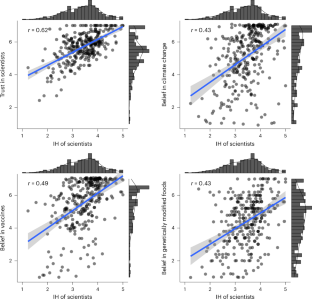The effect of seeing scientists as intellectually humble on trust in scientists and their research
IF 21.4
1区 心理学
Q1 MULTIDISCIPLINARY SCIENCES
引用次数: 0
Abstract
Public trust in scientists is critical to our ability to face societal threats. Here, across five pre-registered studies (N = 2,034), we assessed whether perceptions of scientists’ intellectual humility affect perceived trustworthiness of scientists and their research. In study 1, we found that seeing scientists as higher in intellectual humility was associated with greater perceived trustworthiness of scientists and support for science-based beliefs. We then demonstrated that describing a scientist as high (versus low) in intellectual humility increased perceived trustworthiness of the scientist (studies 2–4), belief in their research (studies 2–4), intentions to follow their research-based recommendations (study 3) and information-seeking behaviour (study 4). We further demonstrated that these effects were not moderated by the scientist’s gender (study 3) or race/ethnicity (study 4). In study 5, we experimentally tested communication approaches that scientists can use to convey intellectual humility. These studies reveal the benefits of seeing scientists as intellectually humble across medical, psychological and climate science topics. Across five pre-registered studies, Koetke et al. find that perceptions of scientists’ intellectual humility positively affect the perceived trustworthiness of scientists and their research.


将科学家视为智力上谦逊的人对信任科学家及其研究的影响
公众对科学家的信任对我们应对社会威胁的能力至关重要。在这里,我们通过五项预先登记的研究(N = 2,034),评估了对科学家智力谦逊的看法是否会影响科学家及其研究的可信度。在研究 1 中,我们发现,科学家的智力谦逊程度越高,人们对科学家的信任度就越高,对科学信仰的支持度也越高。然后,我们证明,将科学家描述为智力谦逊程度高(相对于智力谦逊程度低)的人,会增加对科学家的信任感(研究 2-4)、对其研究的信心(研究 2-4)、遵循其基于研究的建议的意愿(研究 3)和信息搜寻行为(研究 4)。我们进一步证明,科学家的性别(研究 3)或种族/民族(研究 4)并不影响这些效应。在研究 5 中,我们通过实验测试了科学家可以用来传达知识谦逊的交流方式。这些研究揭示了在医学、心理学和气候科学等主题上将科学家视为知识谦逊者的益处。
本文章由计算机程序翻译,如有差异,请以英文原文为准。
求助全文
约1分钟内获得全文
求助全文
来源期刊

Nature Human Behaviour
Psychology-Social Psychology
CiteScore
36.80
自引率
1.00%
发文量
227
期刊介绍:
Nature Human Behaviour is a journal that focuses on publishing research of outstanding significance into any aspect of human behavior.The research can cover various areas such as psychological, biological, and social bases of human behavior.It also includes the study of origins, development, and disorders related to human behavior.The primary aim of the journal is to increase the visibility of research in the field and enhance its societal reach and impact.
 求助内容:
求助内容: 应助结果提醒方式:
应助结果提醒方式:


